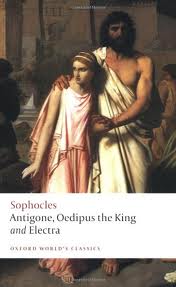Our book choice for September 2012 is Oedipus the King by Sophocles. Oedipus, king of Thebes, is confronted with the problem of plague in the city.
Oedipus the King is a tragedy by the ancient Greek playwright Sophocles, first performed in about 429 BCE. It is the first play in Sophocles’ Theban trilogy, followed by Oedipus at Colonus and Antigone.
The play is set in Thebes, and tells the story of King Oedipus, who unknowingly kills his own father and marries his own mother. The story is based on a myth that was well-known to Greek audiences at the time.
The play opens with a plague ravaging Thebes. The people of Thebes believe that the plague is a punishment from the gods, and they come to Oedipus, their king, for help. Oedipus vows to find the murderer of Laius, the previous king of Thebes, and to rid the city of the plague.
Oedipus sends for Tiresias, the blind prophet, to help him solve the mystery. Tiresias refuses to speak at first, but eventually he tells Oedipus that he himself is the murderer of Laius. Oedipus is shocked and denies the accusation, but Tiresias’s words plant a seed of doubt in his mind.
The play Oedipus the King explores a number of themes, including fate, hubris, and the nature of knowledge. The play suggests that fate is inescapable, and that even the most powerful people are ultimately subject to the will of the gods. Oedipus’s downfall is a result of his hubris, or his excessive pride. He believes that he is above the gods, and he refuses to listen to Tiresias’s warnings. This hubris ultimately leads to his downfall.
The play also explores the nature of knowledge. Oedipus is determined to find the murderer of Laius, but his search for knowledge ultimately leads to his own destruction. He learns that he is the murderer of Laius, and that he is also married to Laius’s widow. This knowledge is too much for him to bear, and it leads to his downfall.
Significance
Oedipus the King is one of the most important and influential plays in Western literature. It has been performed and studied for centuries, and it continues to be relevant today. The play explores universal themes that resonate with audiences of all time periods. It is a powerful and moving tragedy that offers a complex and nuanced view of human nature.
Here are some additional details about the play:
- The play is written in verse, and it is divided into three acts.
- The play is set in Thebes, a city in ancient Greece.
- The characters in the play include Oedipus, Jocasta, Laius, Tiresias, the shepherd, and the chorus.
- The play explores themes of fate, guilt, and the human condition.
- The play is a tragedy, and it ends with the deaths of Oedipus and Jocasta.
Discussion Questions
- What did you make of it, and how did it compare to what you were expecting?
- Did you find it tragic? If so, how?
- Did you find Oedipus sympathetic?
- What did you think about the chorus? What role did it play and did it add anything to your experience of the piece?
- Did Oedipus have free will?
- Does it matter that the audience would have been familiar with the plot? Does Sophocles use our knowledge to make it a better play?
- Did you feel catharsis in the Aristotelian sense?
- Were the characters well-developed?
- Would you read another Greek Tragedy?
- What is the dramatic purpose of the prologue?
- How does Oedipus characterize himself?
- What conditions in Thebes does the Priest describe?
- Why does Oedipus summon Teiresias?
- What is Teiresias’ reaction to Oedipus’ request for help?
- What does Teiresias reveal about Oedipus’ past?
- How does Oedipus respond to Teiresias’ accusations?
- What does Jocasta tell Oedipus about his past?
- What does Oedipus learn from the shepherd?
- How does Oedipus respond to the truth about his past?
- What is the significance of the Sphinx’s riddle?
- What are the themes of Oedipus the King?
- What is the role of the chorus in Oedipus the King?
- What is the message of Oedipus the King?
Individual Ratings
DKB Rating 





